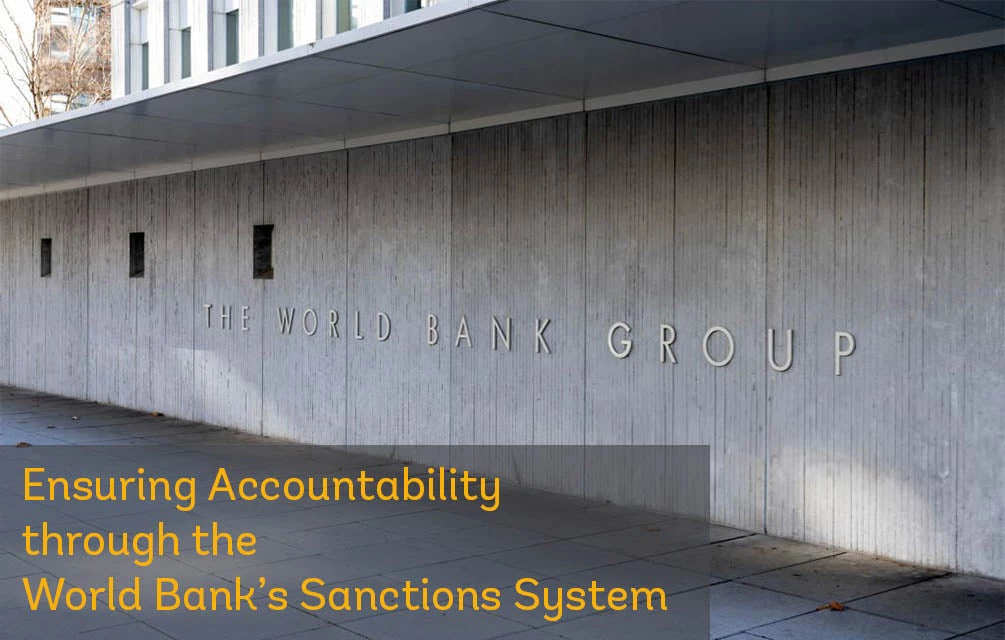 World Bank Group main entrance in Washington DC
World Bank Group main entrance in Washington DC
Anniversaries are powerful. This year’s twentieth anniversary of the United Nations Convention against Corruption (UNCAC) is an opportunity for reflection. With 190 parties as of October 2023, the UNCAC is the only legally binding international anti-corruption agreement. The treaty’s framework sets forth a comprehensive set of measures to prevent and combat corruption, calls for criminalization of the most prevalent misconduct, and requires member states to return assets obtained through this crime to the country from which they were stolen. The convention further calls for sanctions to be extended to those who participate in an attempt to commit corruption.
In commemorating this milestone, it is fitting that the theme for this year’s International Anti-Corruption Day (IACD), on December 9, is “UNCAC at 20: Uniting the World Against Corruption.” On this occasion, we ponder: since the convention’s inception, have nations really united in their fight against corruption?
From an accountability and enforcement perspective, one could argue that the international community has made great strides. For example, within this twenty-year time span, we have seen the birth and enhancement of global administrative sanctions systems across multilateral development banks (MDBs) and international financial institutions (IFIs). Aligned with UNCAC’s goals to reduce corruption and promote integrity and accountability, these international organizations are forging ahead in innovative ways to ensure corruption does not impede sustainable economic growth.
A leader among these institutions is the World Bank, which ensures accountability over its funds with a two-tier process for sanctioning firms and individuals who engage in sanctionable misconduct. The second tier of this process is the Sanctions Board, an appellate administrative review body consisting of seven external independent members, which issues final decisions in all contested World Bank sanctions cases. This tribunal’s core mandate is to provide transparency and accountability through a full and fair de novo review of sanctions cases, the rendering of sanctions proportionate to the misconduct, and the publication of fully reasoned decisions. In the World Bank’s system, sanctions serve both as a deterrent and an incentive for rehabilitation. For example, each sanction issued by the Sanctions Board typically has certain integrity compliance measures the sanctioned company or individual must meet as a condition of release from the sanction. The World Bank’s Integrity Compliance Officer will work with the sanctioned company or individual in their efforts to implement effective integrity compliance reforms to meet the conditions.
In its own unique way, the Sanctions Board contributes to fulfilling the purpose behind UNCAC by its very existence.An external, impartial, quasi-judicial mechanism is critical to ensuring that parties who are accused of committing fraud and corruption have a forum to be heard with full due process and efficiency , and when findings of culpability are made, the responsible actors will be held accountable. This helps create the much-needed trust in donor countries and the public that development funds will be used for their intended purposes. Moreover, this contributes to upholding the principles of the rule of law and core values such as integrity and accountability.
The World Bank has not done this on its own. Just as the UNCAC calls for international cooperation in the fight against corruption, for more than a decade, the MDB community has worked together to develop and implement a harmonized strategy outlined in the Uniform Framework for Preventing and Combating Fraud and Corruption. In continuance of this Framework, the participant MDBs agreed to additional guidelines to harmonize features of their sanctions mechanisms and promote consistency. These include the MDB Harmonized Principles on Treatment of Corporate Groups, General Principles and Guidelines for Sanctions, the Agreement for Mutual Enforcement of Debarment Decisions, MDB General Principles for Settlements, and most recently, MDB General Principles for Business Integrity Programmes. The collective actions of these organizations have brought about many positive changes in how the international community works together to prevent, investigate, and sanction corruption.
Notwithstanding these advancements, there is more to be done to address the gaps and remaining challenges. Some of these include the enhancement of strong whistleblowing policies to create better and safer methods for recipients of public funds to report wrongdoing, dedicated resources to support timely and robust investigations into misconduct, and the continued need to build strong ethical and integrity governance programs and practices. Moreover, we need to be intentional in raising awareness about the role that both individuals and society play in combating corruption and promoting transparency.
As we acknowledge IACD and the twentieth anniversary of UNCAC, I invite you to join me in celebrating the many achievements of the international community in its endeavors to prevent and combat corruption. Let us also reflect on the possibilities that lie ahead and consider how each one of us can work together to make a difference.
#UnitedAgainstCorruption #IACD2023 #UNCAC20


Join the Conversation